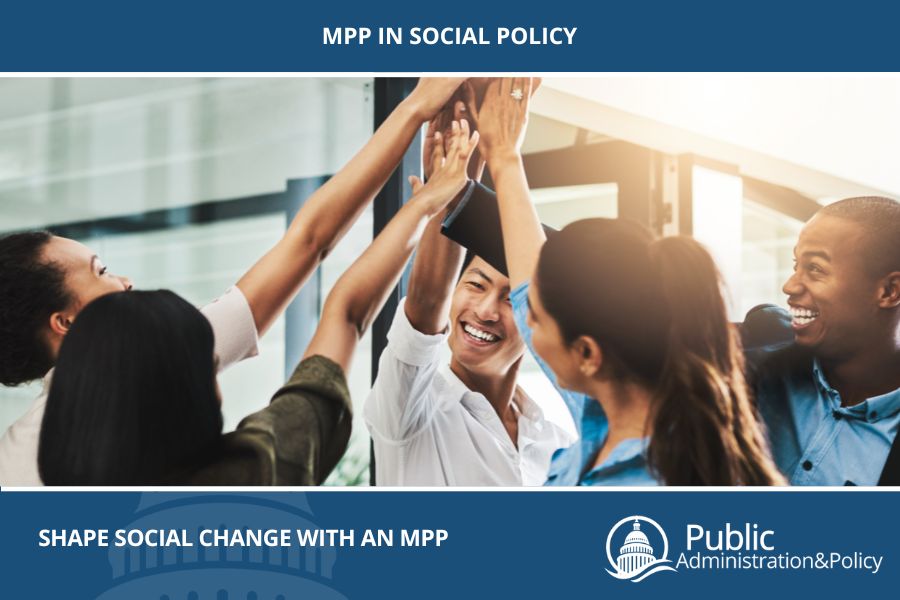A Master of Public Policy (MPP) in Social Policy is a professional degree that prepares students to address critical societal challenges by developing and evaluating policies promoting equity, inclusion, and well-being. This graduate degree program is ideal for individuals passionate about tackling issues like poverty, education, healthcare, housing, and labor rights in the United States.
By integrating required courses in core curriculum, program evaluation, and social work, the program ensures that MPP students gain the tools needed to develop and implement impactful policies. Graduates are prepared to lead initiatives in government agencies, nonprofit organizations, and the private sector.

Table of Contents
An MPP in Social Policy is tailored for individuals dedicated to advancing social equity and justice. This MPP program is ideal for:
- Community Advocates: Professionals committed to improving housing, education, and healthcare access for underserved populations.
- Policy Analysts: Those who aim to evaluate the effectiveness of policies designed to reduce poverty and promote social equity.
- Government Employees: Public servants working in welfare reform, labor policy, and public education.
- Nonprofit Leaders: Individuals seeking to influence policies within organizations that focus on social issues.
| Pros | Cons |
|---|---|
| Offers specialized knowledge in poverty alleviation, education reform, and public welfare. | Limited focus on non-social policy areas, such as technology or defense. |
| Opens career opportunities in the public and private sectors. | Additional certifications may be required for roles in specialized fields. |
| Equips students with practical tools for program evaluation and data analysis. | Some roles may involve significant time and emotional investment. |
This program is ideal for full-time professionals or students aiming to impact social systems meaningfully.
Admissions Requirements
Admissions criteria for an MPP in Social Policy are similar to other public policy MPP specializations. Prospective MPP students should meet the following requirements:
- Bachelor’s Degree: From an accredited institution, preferably in political science, social work, or a related field.
- GPA Requirements: A minimum GPA of 3.0 is typically required, though competitive programs may prefer higher.
- Letters of Recommendation: Two to three references from academic or professional contacts, including faculty members who can attest to your qualifications.
- Personal Statement: Outline your interest in social policy and how the program aligns with your career goals.
- Résumé or CV: Highlighting relevant experience in social work, community advocacy, or related fields.
- Financial Aid Applications: Completing the FAFSA and exploring scholarships, assistantships, or grants specific to social policy studies.
Students may pursue a concurrent degree program, such as combining the MPP with an MSW program or a related graduate degree, providing a well-rounded education in public policy and social work.
The core curriculum for an MPP in Social Policy combines foundational public policy training with specialized elective courses. Most programs require students to complete 36–48 credit hours, including a capstone project or thesis.
Core Courses
Students typically complete essential core courses such as:
- Foundations of Public Policy and Social Equity
- Ethics and Justice in Public Administration
- Quantitative Methods for Policy Analysis
- Public Budgeting and Resource Management
- Program Evaluation in Social Policy
Elective Courses
Students may tailor their education to specific interests by selecting elective courses, such as:
- Education Policy and Reform
- Housing and Urban Development Policy
- Healthcare Access and Inequality
- Labor Policy and Workforce Development
- Child Welfare and Family Policy
Capstone Project
The capstone project allows students to apply their knowledge to real-world social policy challenges. Examples include:
- Evaluating the impact of affordable housing programs in urban areas.
- Designing policies to reduce disparities in public education.
- Developing strategies to improve access to childcare services for low-income families.
An MPP in Social Policy prepares graduates for many impactful roles in public policy programs, public and private sectors, and advocacy organizations. Common career paths include:
- Policy Advisor: Works with governments and nonprofits to design and implement policies that address social inequalities.
- Social Program Manager: Oversees the development and administration of housing, healthcare, or education programs.
- Research Analyst: Conducts studies to evaluate the effectiveness of social programs and recommend improvements.
- Nonprofit Director: Leads initiatives on poverty reduction, workforce development, and community outreach.
- Legislative Analyst: Assists lawmakers in crafting policies that promote social justice and equity.
These roles require a blend of program evaluation, leadership abilities, and a deep understanding of social systems.
The Master of Public Policy in Social Policy offers a unique opportunity to address societal challenges and drive meaningful change through policymaking.
Key Benefits
- Specialized Knowledge: Focuses on critical social issues such as housing, healthcare, and labor rights.
- Career Opportunities: Graduates can pursue roles in government agencies, nonprofits, and advocacy organizations.
- Real-World Applications: Includes case studies and program evaluation to prepare students for practical challenges.
- Concurrent Degrees: Some schools offer concurrent degree programs, such as combining the MPP with an MSW or sociology degree.
- Financial Aid Options: Many programs provide scholarships, assistantships, and grants to support students interested in social policy.
This degree equips graduates with the tools to influence policies that address inequalities and improve the quality of life for diverse populations.
Sources
- NASPAA. “Accreditation Standards for Public Policy Programs.” https://www.naspaa.org
- U.S. News & World Report. “Best Online MPP Programs.” https://www.usnews.com
- Bureau of Labor Statistics (BLS). “Occupational Outlook Handbook: Social Policy Careers.” https://www.bls.gov
Acknowledgment
This guide provides an overview of the MPP in Social Policy, offering insights into the curriculum, admissions requirements, and career opportunities for students dedicated to advancing social equity and justice.